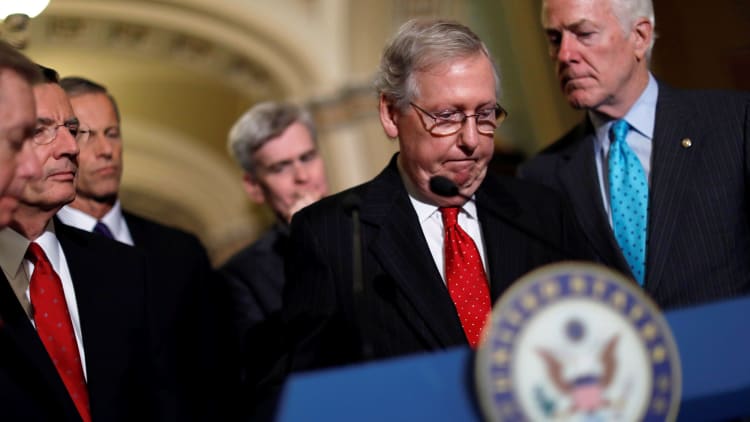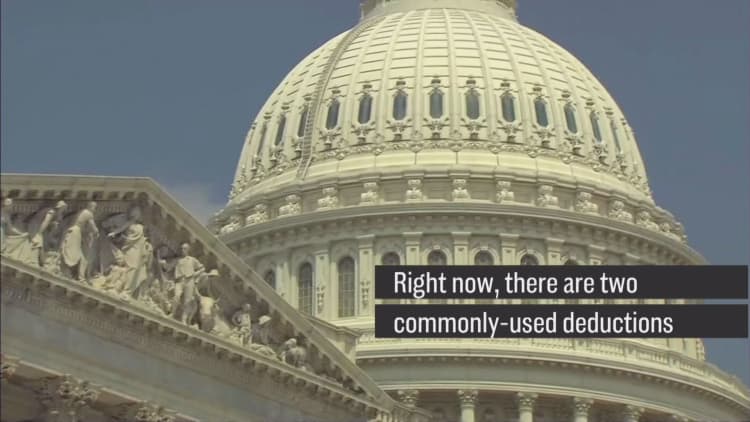
"Winning breeds winning," taught legendary basketball coach John Wooden. As they turn now to tax reform, Republicans in Washington hope the opposite isn't also true.
In recent days, President Donald Trump and GOP leaders have suffered another health-care defeat in slow motion. First one, then a second, and, finally, a decisive third Republican senator announced opposition to the latest attempt to repeal and replace Obamacare.
That made it no surprise Tuesday when Senate Majority Leader Mitch McConnell announced there would be no floor vote on the so-called Graham-Cassidy plan to replace Obamacare with federal health care block grants. Yet it repeated the pain of earlier failures that have left Trump and the GOP rank-and-file grousing about lawmakers' inability to fulfill their promises.
Do those failure weaken prospects for tax reform proposals the Trump administration had hoped would already have be signed into law by now? Some Republicans fear the answer is yes.
"Health failures hurt the tax effort," said conservative tax expert Alan Cole, until recently an analyst at the Tax Foundation. "Recent defections," he explained, "have reduced the expectation that the GOP will work together."
Republicans aim to pass tax reform through the same special budget rules they used on health care, which preclude a filibuster by Senate Democrats. That only works if the 52-member GOP caucus can achieve consensus among at least 50 senators, allowing Vice President Mike Pence to break a tie if necessary.
Yet as Trump and GOP leaders prepare to offer some tax plan details Wednesday, Republicans have not reached consensus on key issues. Those include the size and scope of the plan, whether it can increase the deficit or not, how low the rate on businesses can go, and whether taxes can be reduced for wealthy Americans.
Internal GOP disagreements have lately grown more pronounced, not less. Trump now insists that tax reform won't cut taxes for the rich, even though his 2016 campaign proposal did. House Speaker Paul Ryan, who backs a cut in the top individual rates, has rejected the idea of comparing effects on different income groups as Democratic-style class warfare.
Steve Bannon, until recently Trump's chief White House strategist, now attacks "establishment" thinking like Ryan's from the outside. Having returned to champion of blue-collar populism at Breitbart News, Bannon campaigned over the weekend for an Alabama Republican Senate candidate against an opponent backed by both the president and McConnell.
Some Capitol Hill veterans insist there will be no health care hangover on tax reform. A tax-cutting debate, they explain, is inherently more unifying for the small-government party than one about Obamacare services.
"Health care is always an away game for GOPers," observed Michael Steel, who was a top aide to former House Speaker John Boehner. "Tax is our home court."
And with 2018 midterm elections looming, tax reform has taken on "do-or-die" urgency, adds Rohit Kumar, a former policy aide to McConnell. Moreover, he said Democrats will find it harder to mobilize against giving Americans tax cuts than against taking away their health benefits.
But with Trump broadly unpopular, and Republicans dispirited, some Democrats insist they enter the fight with renewed energy and political momentum.
"Painting Republicans as the party of billionaires and CEOs is our wheelhouse, and this billionaire-filled administration is walking right into it," boasted Adam Jentleson, a former Senate Democratic leadership aide.
"A lot of people who have been engaging in political action this year, many for the first time, are seeing that their action has a major impact," added Jentleson, now at the liberal Center for American Progress. "On our side, there's the reverse effect of success begetting success."
WATCH: GOP tax plan could trash value of two tax breaks



